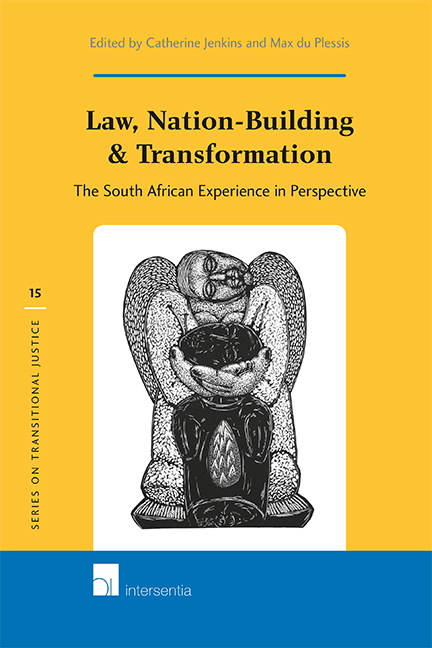Book contents
- Frontmatter
- Editors’ Foreword
- Contents
- Chapter 1 Transitional Justice: Lessons from South Africa?
- Chapter 2 Reflections on Post-Apartheid Nation-Building: Identity, Participation, Community
- Chapter 3 The Truth and Reconciliation Commission Process: A Retrospective
- Chapter 4 Rights at Work: The Transition to Constitutional Democracy and Women in South Africa
- Chapter 5 Crime, Policing and Nation-Building
- Chapter 6 Public Schools for Afrikaners in South Africa
- Chapter 7 Behind the Mask of the Rainbow Nation: The Limits of Law in Post-Apartheid South Africa
- Chapter 8 The Transformation of the Judiciary
- Chapter 9 Assessing the Social Transformation Performance of the South African Constitutional Court: From Totalitarianism to the Rule of Law
- Chapter 10 The Transformation of Land Law
- Chapter 11 The South African Presidency in Comparative African Context
- Chapter 12 Aspects of the Treatment of Freedom of Expression in South Africa’s Democratic Transition
- Chapter 13 Constitutionalism in Commonwealth Africa: Comparative Perspectives
Chapter 7 - Behind the Mask of the Rainbow Nation: The Limits of Law in Post-Apartheid South Africa
Published online by Cambridge University Press: 16 December 2020
- Frontmatter
- Editors’ Foreword
- Contents
- Chapter 1 Transitional Justice: Lessons from South Africa?
- Chapter 2 Reflections on Post-Apartheid Nation-Building: Identity, Participation, Community
- Chapter 3 The Truth and Reconciliation Commission Process: A Retrospective
- Chapter 4 Rights at Work: The Transition to Constitutional Democracy and Women in South Africa
- Chapter 5 Crime, Policing and Nation-Building
- Chapter 6 Public Schools for Afrikaners in South Africa
- Chapter 7 Behind the Mask of the Rainbow Nation: The Limits of Law in Post-Apartheid South Africa
- Chapter 8 The Transformation of the Judiciary
- Chapter 9 Assessing the Social Transformation Performance of the South African Constitutional Court: From Totalitarianism to the Rule of Law
- Chapter 10 The Transformation of Land Law
- Chapter 11 The South African Presidency in Comparative African Context
- Chapter 12 Aspects of the Treatment of Freedom of Expression in South Africa’s Democratic Transition
- Chapter 13 Constitutionalism in Commonwealth Africa: Comparative Perspectives
Summary
INTRODUCTION
During the immediate post-apartheid period, much legal discourse in South Africa focused on the promise, set out in the country's new democratic constitution, of a better life for all South Africans. In light of South Africa's dark history under colonialism and apartheid, it is perhaps not surprising that much legal and scholarly discourse was, and still is, imbued with a sense of optimism that the constitutional project on which the country has embarked will eventually secure true dignity and substantive equality for the majority of South Africans. It is difficult to dispute the great strides that have been made in many areas of social life in the country, from the delivery of housing, water and electricity to hundreds of thousands of poor households, to the promotion and protection of the dignity of minority groups, through groundbreaking measures such as the recognition of gay marriages. In no small part, many of the important advances brought about in pursuance of substantive equality and true dignity for all South Africans have been due to the enlightened and impressive jurisprudence developed by the South African Constitutional Court since 1995.
Despite all the achievements of the post-apartheid period, however, it is the contention of this chapter that dissonant notes are increasingly being sounded within the legal and scholarly discourse referred to above. An alternative legal discourse has begun to emerge which is far more critical of South Africa's constitutional project and its prospects for success. In some cases, this alternative legal discourse seems to draw inspiration from the broad traditions of the critical left and appears, to us, to resonate with the broad approach adopted by the Critical Legal Studies (CLS) Movement which was popular during the 1970s and 1980s. It is the purpose of this chapter to trace various elements of the emerging critical discourse, making use of a CLS-inspired approach. Among the broad questions posed by this chapter is whether or not post-apartheid South Africa, in particular its legal system and new constitutional order, has lived up to the expectations of those who struggled for so long to end the apartheid system.
- Type
- Chapter
- Information
- Law, Nation-Building and TransformationThe South African Experience in Perspective, pp. 169 - 198Publisher: IntersentiaPrint publication year: 2014
- 1
- Cited by

